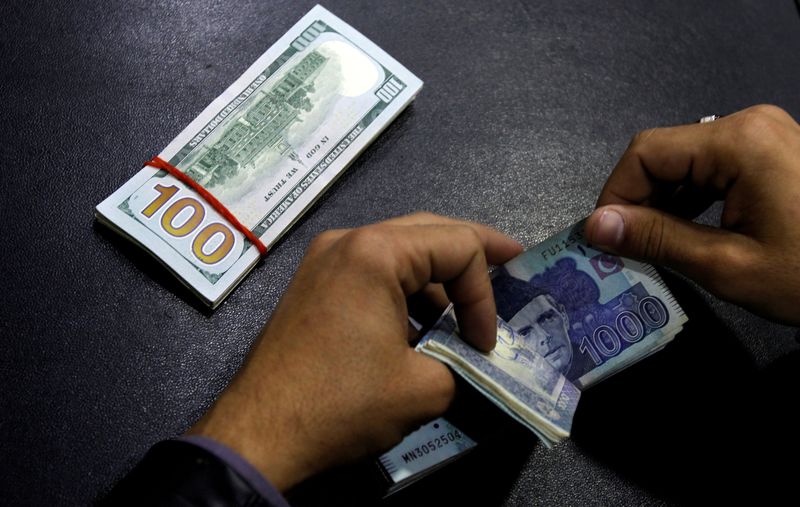Pakistani rupee opens slightly firmer, markets await new finance minister
2022.09.26 07:04
[ad_1]

© Reuters. FILE PHOTO: A currency trader counts Pakistani Rupee notes as he prepares an exchange of U.S dollars in Islamabad, Pakistan December 11, 2017. REUTERS/Caren Firouz/File Photo
By Syed Raza Hassan
KARACHI, Pakistan (Reuters) -The Pakistani rupee opened slightly stronger on Monday as market participants awaited the announcement of a new finance minister, at a time when the country grapples with economic turmoil worsened by devastating floods.
The rupee opened at 239.65 to a dollar and gained around 1% in the opening session, the forex exchange association said.
Finance Minister Miftah Ismail said on Sunday he planned to formally resign from the role. He is likely to be replacement by a senator form his party Ishaq Dar, who according to analysts is known for keeping the rupee over-valued or stable against the dollar.
They both come from the ruling party of Prime Minister Shehbaz Sharif, who is leading a government comprising several political parties.
Dar has previously served as the finance minister more than once during the rule of Sharif’s Pakistan Muslim League – Nawaz (PML-N).
“The Dar factor is at play. There are memories of how he kept the dollar rate stable,” Fahad Rauf at Ismail Iqbal securities told Reuters.
The dollar is strengthening against most global currencies, and Pakistan, hit hard by cataclysmic floods, is in a tight spot with less foreign reserves, he said.
“There is no way (the rupee) can sustainably move against the tide in the current scenario,” Rauf said.
NEAR DEFAULT
The ruling party has repeatedly said it inherited one of the worst economies from former prime minister Imran Khan, who was ousted in a vote of no-confidence in April. Khan denies he passed on a broken economy.
As the new government took over, a rescue programme with the International Monetary Fund (IMF) was in the doldrums because of a lack of agreed policy framework.
Ismail said he pulled the country out of a near default situation, but markets have not responded positively, with the rupee tumbling to a record low and inflation crossing over 27%.
The unpopular decisions Ismail took to adhere to the IMF preconditions, like rolling back power and fuel subsidies given by Khan in his last weeks in power, caused high inflation and the rupee devaluation.
It raised questions within Ismail’s party that the all-time high inflation was denting its vote constituency as Khan has received unexpectedly large public support ahead of general elections late next year, said officials with the ruling coalition.
With the economy in a tailspin with one of its worst balance of payment crises, devastating floods hit the nation that are estimated to have cost it nearly $30 billion, and forcing the government to cut its GDP growth forecast below 3% from a 5% budgetary target for 2022-23.
[ad_2]
Source link








